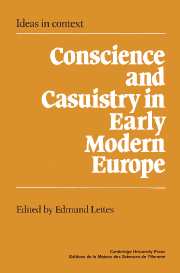Book contents
- Frontmatter
- Contents
- Notes on contributors
- Introduction
- 1 Governing conduct
- 2 Laxity and liberty in seventeenth-century English political thought
- 3 Casuistry and character
- 4 Prescription and reality
- 5 The ‘new art of lying’: equivocation, mental reservation, and casuistry
- 6 Kant and casuistry
- 7 Moral arithmetic: Seven Sins into Ten Commandments
- 8 Optics and sceptics: the philosophical foundations of Hobbes's political thought
- Index
5 - The ‘new art of lying’: equivocation, mental reservation, and casuistry
Published online by Cambridge University Press: 13 October 2009
- Frontmatter
- Contents
- Notes on contributors
- Introduction
- 1 Governing conduct
- 2 Laxity and liberty in seventeenth-century English political thought
- 3 Casuistry and character
- 4 Prescription and reality
- 5 The ‘new art of lying’: equivocation, mental reservation, and casuistry
- 6 Kant and casuistry
- 7 Moral arithmetic: Seven Sins into Ten Commandments
- 8 Optics and sceptics: the philosophical foundations of Hobbes's political thought
- Index
Summary
The word ‘casuistry’ has two meanings. Firstly, it signifies ‘the art or science of bringing general moral principles to bear upon particular cases’. Secondly, it means ‘sophistical, equivocal, or specious reasoning’. The connection between the two is historical. Catholic casuists, and particularly Jesuits, were accused by their opponents in the sixteenth and seventeenth centuries of employing sophistry in support of lax and absurd moral conclusions. The mud stuck. Casuistry was the dominant form of moral theorizing in late medieval and early modern Europe. Yet Henry Sidgwick was content to give it short shrift in his Outlines of the History of Ethics. The Jesuits, he said, attempted to win back souls from Protestantism ‘by accommodating ecclesiastico-moral law to worldly needs’. The excesses to which this laxity led were decisively ‘revealed to the world in the immortal Provincial Letters of Pascal’.
In Sidgwick's view, Catholic thinkers had been hampered not only by moral but also by intellectual failings. Scholasticism, he claimed, had shackled ‘the renascent intellectual activity which it stimulated and exercised, by the double bondage to Aristotle and to the Church’. As long as thought remained the slave of authority, moral philosophy in its modern sense remained impossible. Similarly, William Whewell, in his Lectures on the History of Moral Philosophy in England, dismissed casuistry in a preliminary ‘Note’, and granted it that much space only because he was lecturing as Professor of Moral Theology or Casuistical Divinity.
- Type
- Chapter
- Information
- Conscience and Casuistry in Early Modern Europe , pp. 159 - 184Publisher: Cambridge University PressPrint publication year: 1988
- 15
- Cited by



